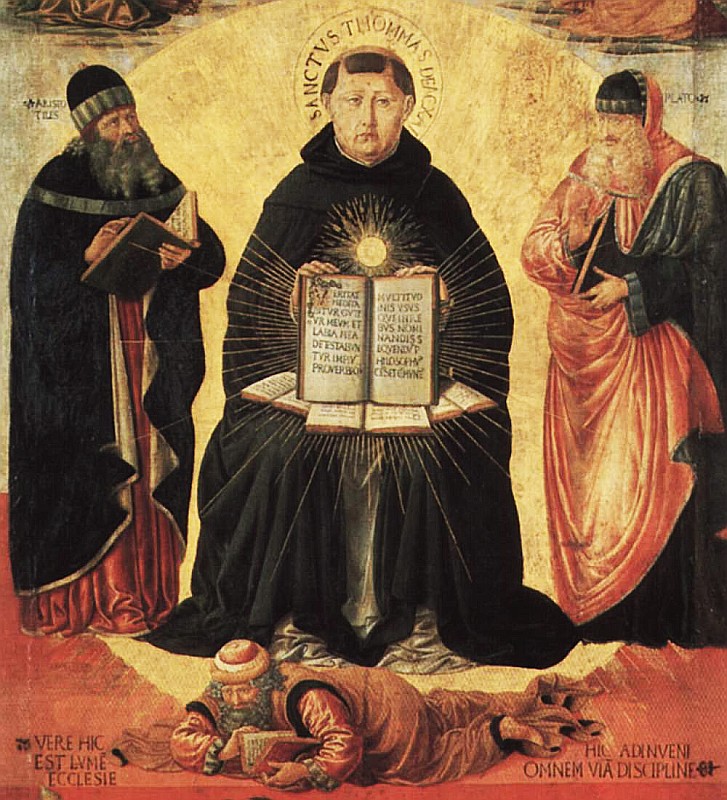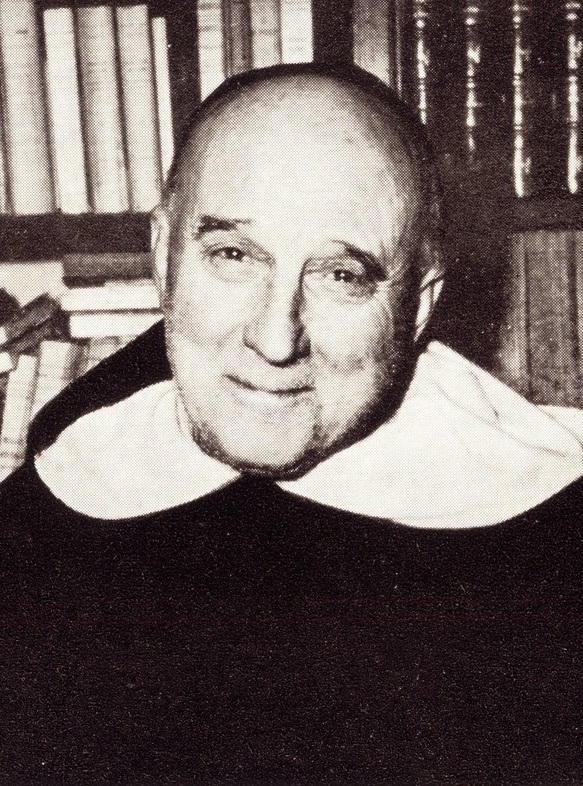Online Source: www.breviary.net
Absolutio: Ipsíus píetas et misericórdia nos ádjuvet, qui cum Patre et Spíritu Sancto vivit et regnat in sæcula sæculórum.R. Amen. | Absolution: May his loving-kindness and mercy assist us. Who, with the Father, and the Holy Ghost, liveth and reigneth, for ever and ever. R. Amen. |
V. Jube domne, (Dómine) benedícere. | V. Vouchsafe, Reverend Father (O Lord), thy blessing. |
Benedíctio 4: Deus Pater omnípotens sit nobis propítius et clemens. R. Amen. | Benediction 4: May God the Father Almighty shew us his mercy and pity. R. Amen. |
| Lesson iv | |
| Sermo sancti Bernardíni Senénsis | The Lesson is taken from a Sermon by St. Bernardine of Siena |
| E Sermone 9 de Visitatione | |
 | |
Quis mortálium, nisi divíno tutus oráculo, de vera Dei et hóminis Genitríce quidquam módicum, sive grande præsúmat incircumcísis, immo pollútis lábiis nomináre, quam Pater ante sæcula Deus perpétuam prædestinávit in Vírginem, digníssimam Fílius elégit in Matrem, Spíritus Sanctus omnis grátiæ domicílium præparávit? Quibus verbis ego homúnculus sensus altíssimos virgínei Cordis, sanctíssimo ore prolátos, éfferam, quibus non súfficit lingua ómnium Angelórum? Dóminus enim ait : Bonus homo de bono thesáuro cordis profert bona ; quod verbum potest étiam esse thesáurus. Quis inter puros hómines mélior homo potest excogitári, quam illa, quæ méruit éffici Mater Dei, quæ novem ménsibus in corde et in útero suo ipsum Deum hospitáta est? Quis thesáurus mélior, quam ipse divínus amor quo fornáceum cor Vírginis ardens erat? | What man, unless secure in a divine oracle, may presume to speak with impure, indeed with polluted lips, anything little or great about the true Parent of God and of man, whom the Father before all ages predestined a perpetual Virgin, whom the Son chose as his most worthy Mother, whom the Holy Ghost prepared as the dwelling place of every grace? With what words shall I, a lowly man, give expression to the highest sentiments of the virginal Heart uttered by the holiest mouth, for which the tongues of all the Angels do not suffice? For the Lord saith : A good man bringeth forth good things from the good treasure of his heart ; and this word can also be a treasure. Among pure mortals who can be conceived of as better than she who was worthy to be the Mother of God, who for nine months had as a guest in her heart and in her womb God himself? What better treasure than the divine love itself, which was burning in the Heart of the Virgin as in a furnace? |
V. Tu autem, Dómine, miserére nobis. R. Deo grátias. | V. But thou, O Lord, have mercy upon us. R. Thanks be to God. |
R. Sicut cedrus exaltáta sum in Líbano, et sicut cypréssus in monte Sion : quasi myrrha elécta, * Dedi suavitátem odóris. V. Et sicut cinnamómum et bálsamum aromatízans. R. Dedi suavitátem odóris. | R. I was exalted like a cedar in Libanus, and as cypress tree upon the mountain of Hermon,* And I yielded a pleasant odour like the best myrrh. V. I gave a sweet smell like cinnamon and aspalathus. R. And I yielded a pleasant odour like the best myrrh. |
V. Jube domne, (Dómine) benedícere. | V. Vouchsafe, Reverend Father (O Lord), thy blessing. |
Benedíctio 5: Christus perpétuæ det nobis gáudia vitæ.R. Amen. | Benediction 5: May Christ bestow upon us the joys of life eternal. R. Amen. |
| Lesson v | |
De hoc ígitur Corde quasi de fornáce divíni ardóris Virgo beáta prótulit verba bona, id est, verba ardentíssimæ caritátis. Sicut enim a vase summo et óptimo vino pleno, non potest exíre nisi óptimum vinum ; aut sicut a fornáce summi ardóris non egréditur nisi incéndium fervens ; sic quippe a Christi Matre exíre non pótuit verbum, nisi summi summéque divíni amóris atque ardóris. Sapiéntis quoque dóminæ et matrónæ est pauca verba, sólida tamen atque sententiósa habére ; proínde septem vícibus quasi septem verba tantum miræ senténtiæ et virtútis a Christi benedictíssima Matre legúntur dicta, ut mystice ostendátur ipsam fuísse plenam grátia septifórmi. Cum Angelo bis tantúmmodo est locúta. Cum Elísabeth bis étiam. Cum Fílio étiam bis, semel in templo, secúndo in núptiis. Cum minístris semel. Et in his ómnibus semper valde parum locúta est ; excépto quod in laude Dei et gratiárum actióne se ámplius dilatávit, scílicet, quum ait : Magníficat ánima mea Dóminum. Ubi non cum hómine, sed cum Deo locúta fuit. Hæc septem verba secúndum septem amóris procéssus et actus sub miro gradu et órdine sunt proláta ; quasi sint septem flammæ fornácei Cordis ejus. | And so, from this Heart as from a furnace of divine ardour the blessed Virgin brought forth good works, that is, words of the most ardent charity. For as from a vessel full of the richest and best wine only good wine can be poured ; or as from a furnace of intense heat only a burning fire is emítted ; so indeed from the Mother of Christ no word can go forth except of the greatest and most intense divine love and ardour. It is also the mark of a wise woman and matron to speak few words, but words that are effective and full of meaning ; and so seven times, as it were, seven words of such wonderful meaning and virtue are read as having been uttered by the most blessed Mother of Christ, that mystically it may be shewn she was full of the sevenfold grace. To the Angel twice only did she speak ; to Elizabeth also twice ; with her Son likewise twice, once in the temple, and a second time at the marriage feast ; and once to the attendants. And on all those occasions she always said very little ; with this one exception that she spake at length in the praise of God and in thanksgiving, namely, when she said : My soul doth magnify the Lord. But here she did not speak with man, but with God. Those seven words were spoken in a wonderful degree and order according to the seven courses and acts of love ; as if they were seven flames from the furnace of her Heart. |
V. Tu autem, Dómine, miserére nobis. R. Deo grátias. | V. But thou, O Lord, have mercy upon us. R. Thanks be to God. |
R. Quæ est ista quæ procéssit sicut sol, et formósa tamquam Jerúsalem? * Vidérunt eam fíliæ Sion, et beátam dixérunt, et regínæ laudavérunt eam.V. Et sicut dies verni circúmdabant eam flores rosárum et lília convállium. R. Vidérunt eam fíliæ Sion, et beátam dixérunt, et regínæ laudavérunt eam. | R. Who is she that looketh forth as the morning, clear as the sun, fair as the moon, comely as Jerusalem? * The daughters of Sion saw her and blest her ; the queens also, and they did praise her.V. As the flower of roses in the spring of the year, and as lilies by the rivers of waters, so did they cluster round about her. R. The daughters of Sion saw her and blest her ; the queens also, and they did praise her. |
V. Jube domne, (Dómine) benedícere. | V. Vouchsafe, Reverend Father (O Lord), thy blessing. |
Benedíctio 6: Ignem sui amóris accéndat Deus in córdibus nostris. R. Amen. | Benediction 6: May God enkindle in our hearts the fire of his holy love. R. Amen. |
| Lesson vi | |
| Ex ecclesiasticis documentis | |
 Pope Pius XII | |
Cultum litúrgicum, quo Cordi Immaculáto Vírginis Maríædébitus tribúitur honor, cuíque plures viri sancti ac mulíeres viam parárunt, ipsa Apostólica Sedes primum approbávit ineúnte sæculo undevicésimo, cum Pius Papa séptimus festum Puríssimi Cordis Maríæ Vírginis instítuit, ab ómnibus diœcésibus et religiósis famíliis, quæ id petiíssent, pie sanctéque agéndum : quod póstmodum Pius Papa nonus Offício ac Missa própria auxit. Ardens autem stúdium atque optátum, jam sæculo décimo séptimo exórtum et in dies invaléscens, ut nempe ejúsmodi festum, majóri solemnitáte donátum, totíus Ecclésiæ commúne efficerétur, Summus Póntifex Pius duodécimus benígne excípiens anno millésimo nongentésimo quadragésimo secúndo, bello atrocíssimo per orbem fere totum ingravescénte, infínítas populórum ærúmnas míserans, pro sua in Matrem cæléstem pietáte ac fidúcia genus hóminum univérsum illíus Cordi benigníssimo obsecratióne solémni eníxe commendávit, atque in honórem ejúsdem Immaculáti Cordis festum cum Officio et Missa própriis in perpétuum ubíque celebrándum indíxit. | The liturgical worship, through which due honour is given to the Immaculate Heart of the Virgin Mary, and for which many holy men and women have prepared the way, the Apostolic See itself first approved in the beginning of the nineteenth century, when Pope Pius VII instituted the feast of the Most Pure Heart of the Virgin Mary, to be piously and reverently celebrated by all the dioceses and religious families who had asked for it. Afterwards Pope Pius IX added an Office and a proper Mass to it. But an ardent desire and longing, which had arisen in the seventeenth century, grew day by day, that namely, the same Feast, given greater solemnity, might be spread to the entire Church. In 1942, Pope Pius XII, graciously acceding to this wish, and during the terrible war then ravaging almost the entire world, pitying the infinite hardships of men, and because of his devotion and confidence in our heavenly Mother, in solemn supplication earnestly entrusted the entire human race to her most generous Heart, and in honour of the same Immaculate Heart he ordered a Feast to be kept forever with its proper Office and Mass. |
V. Tu autem, Dómine, miserére nobis. R. Deo grátias. | V. But thou, O Lord, have mercy upon us. R. Thanks be to God. |
R. Ornátam monílibus filiam Jerúsalem Dóminus concupívit :* Et vidéntes eam fíliæ Sion, beatíssimam prædicavérunt, dicéntes : * Unguéntum effúsum nomen tuum. V. Astitit regína a dextris tuis in vestítu deauráto, circúmdatavarietáte. R. Et vidéntes eam fíliæ Sion, beatíssimam prædicavérunt, dicéntes : V. Glória Patri, et Fílio, et Spirítui Sancto. R. Unguéntum effúsum nomen tuum. | R. When the Lord beheld the daughter of Jerusalem adorned with her jewels, he greatly desired her beauty : * And when the daughters of Sion saw her, they cried out that she was most blessed, saying : * Thy name is as ointment poured forth.V. Upon thy right hand did stand the Queen in a vesture of gold wrought about with divers colours. R. And when the daughters of Sion saw her, they cried out that she was most blessed, saying :V. Glory be to the Father, and to the Son, and to the Holy Ghost. R. Thy name is as ointment poured forth. |








No comments:
Post a Comment